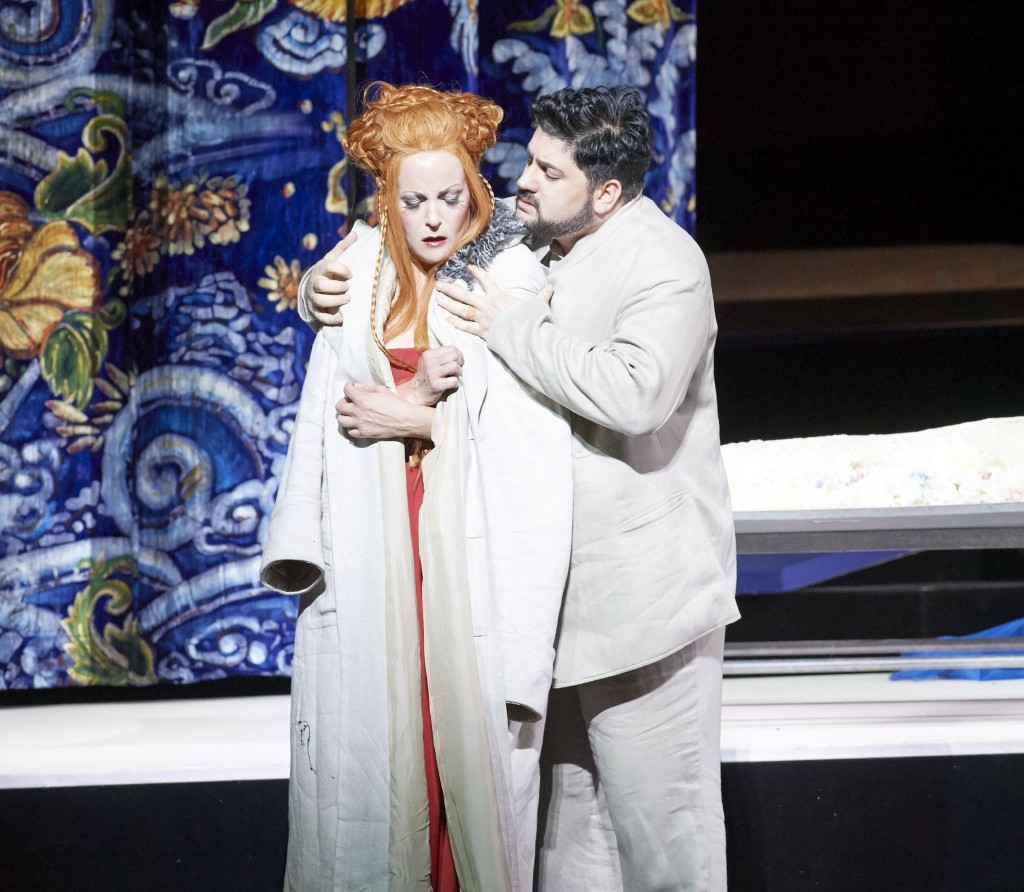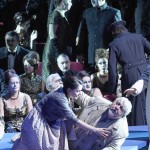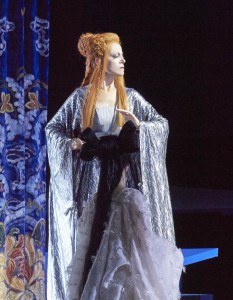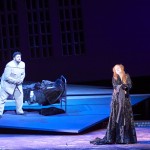 Once upon a time, somewhere in China, lived ‘the ice princess’ Turandot, who put countless suitors to the test: to answer her riddles, on pain of death, or marriage. All failed until Prince Caleb, but will he win her love?
Once upon a time, somewhere in China, lived ‘the ice princess’ Turandot, who put countless suitors to the test: to answer her riddles, on pain of death, or marriage. All failed until Prince Caleb, but will he win her love?
The story is a fairy tale, Puccini’s opera Turandot a psychological take engaging with themes of love in death; and made fabulous by Puccini’s score featuring original Chinese melodies. Puccini, ever-obsessed with authentic detail, deliberately chose the oriental setting. How else would it make sense?
Modern directors always know better. The distinguished Marco Arturo Marelli is both stage designer and director for Vienna State Opera’s new production.
In the Prologue , there’s a musical box; and a desk on a raised stage ; then a Chinese-themed curtain is raised on a live puppet show ; and the mandarin’s proclamation of the law: Turandot will marry only the man who can solve three riddles, and whoever fails, dies.
Yet facing us, rear of the stage, sit a modern audience – mirroring conventional operagoers- in evening dress. They, in tiered rows, are watching the show from behind.
Marinelli’s concept is too clever by half. He seems to be framing the Turandot narrative as if it’s being watched by a contemporary audience in some eastern totalitarian state. So the secret police, threatening plain-clothed and uniformed, seem to be Princess Turandot’s henchmen, instrumenting her tyranny. Meanwhile, Chinese jugglers, acrobats and choreographed puppets interweave the main narrative. Confusing? The result interrupts the dramatic flow; we aren’t allowed to get involved , suspend belief, in this fairy tale. We are denied the emotional catharsis of identifying with the characters, of being swept away in the big story, the great arias.
And, unfortunately, this production lacked truly great performers in the lead roles (although support cast were exceptional) to compensate for the staging. The ‘unknown’ Prince Calaf – (Yusuf Eyvavazov) , dark, bearded , in a white coat- intercedes to save the condemned Persian suitor; and is spellbound by Turandot’s cruel beauty. In his unexpected encounter with his long-lost father, Eyvazov’s tenor is not exceptional , whereas Timur, white-bearded Dan Paul Dimitrescu’s bass, has tremendous ballast, and is movingly enacted. He’s accompanied and comforted by the slave Liu (Anita Hartig), secretly in love with Calaf; and she, in her unselfish love, will sacrifice her life for him. Hartig is the highlight of the evening – in a role usually diminished by the other two leads in the love triangle. 
Turandot is the tall, red-haired Lise Lindstrom. Calaf appeals to her divine beauty (Oh marvel, oh dream!) – spellbound, intoxicated by her perfume, he suffers. A chorus – shockingly misogynistic- rail at him to give up women (with a hundred women, you have all legs and breasts.) Beware of her gong!
Liu can hear no music. Her heart is breaking for Calaf. Hartig, in peasant’s garb, has a purity and clarity – like clear spring water- in Liu’s aria, her innocence and charm enormously moving. Do not weep! Her master may not be alive tomorrow. She will make Timur’s exile easier. Eyvazov’s Calaf, however, is no great stage presence; he shuffles around in his greatcoat looking moved.
The Ping, Pong, Pang interlude serves as comic relief, but also as a political commentary on life in China under Turandot’s despotism. They come on in black, like morticians, behind them a glass cabinet, displaying a selection of heads decapitated. Farewell love: China no longer exists! Their tranquil life ended, ‘they are ministers of the executioner.’ Each is homesick for his provincial home, one in Honan (reading sacred books); another in Tsian, the other in Kiv. (All specific Chinese places, testifying to Puccini’s librettists’ – Giuseppe Adami and R.Simoni- attention to detail.)
A frail, white-haired man is wheeled on, behind him three dignitaries in purple. The Mandarin (Paulo Rumetz) tries to dissuade Calaf: an oath forces him to implement harsh laws. Enough, young man, leave, he warns; he will not have another on his conscience. Yet Calaf will undergo the trial; impelled as if by a strange obsession with death, Liebestod, love in death. (Puccini noted in a sketch for the final duet: ‘and then Tristan.’)
 Lise Lindstrom’s Turandot enters in a cobalt-blue silk coat , Lindstrom with spookily long red hair and white makeup. In her big aria, In questia Reggia, a thousand years ago a hopeless cry sounded in the palace; she sings of her ancestor who ruled with joy; then fear and terror reigned. Now she will avenge her death on him. ‘No one will possess me! Grim death lives in me’, she repeats. Lindstrom’s is an expressive, psychologically modern take; expressionist, anguished. Lindstrom’s high range, seldom tested, is solid. In putting Calaf through her tests, she eyeballs him with contempt; then increasingly unnerved with each win. Yes, ‘Hope’ always misleads. She pokes him with her scroll, helplessly, in frustration. His ‘fire’ will thaw her, he sings. Her ceremonial cloak of office is removed, now revealing her in brilliant red. She pleads with her father. He cannot give his sacred daughter to him like a slave. (Don’t look at me like that, ridiculing her pride!) She takes a knife as if to stab herself.
Lise Lindstrom’s Turandot enters in a cobalt-blue silk coat , Lindstrom with spookily long red hair and white makeup. In her big aria, In questia Reggia, a thousand years ago a hopeless cry sounded in the palace; she sings of her ancestor who ruled with joy; then fear and terror reigned. Now she will avenge her death on him. ‘No one will possess me! Grim death lives in me’, she repeats. Lindstrom’s is an expressive, psychologically modern take; expressionist, anguished. Lindstrom’s high range, seldom tested, is solid. In putting Calaf through her tests, she eyeballs him with contempt; then increasingly unnerved with each win. Yes, ‘Hope’ always misleads. She pokes him with her scroll, helplessly, in frustration. His ‘fire’ will thaw her, he sings. Her ceremonial cloak of office is removed, now revealing her in brilliant red. She pleads with her father. He cannot give his sacred daughter to him like a slave. (Don’t look at me like that, ridiculing her pride!) She takes a knife as if to stab herself.
She looks desolate – pitiful in her disgrace. Now Calaf poses her his own riddle: ‘Tell me my name before daybreak’, and he will gladly die. (The onstage ‘audience’ behind are actually waving yellow flags. Why?)
A camp-bed upper stage: Calaf sprawled out in, apparently, an attic cell. Eyvazov’s Calaf, in a linen suit with mandarin collar, Nessun dorma! You in your cold room . My secret is safe. No one will know my name. He will tell it to her when day breaks. His kiss will break her silence- the heavenly hushed chorus whisper ‘nightfall’- I shall win. Eyvazov’s was competently sung, but there’s no real personality, and without any of those tingling high notes to inspire an audience. The obligatory applause had barely begun , to be abruptly stopped – by secret police who, flashing torches, storm the stage. They drag on near-naked strippers. (‘They are beautiful beneath their veils.’) Bad move, Marelli! Deliberately curtailing the applause is like breaking a spell, cutting short the audience’s emotional release.
However, the high point comes unexpectedly. Liu offers to save Calaf. She knows his name; rather she die for him. ‘Who gives you such strength? Princess, it is love! Love? A love (like hers) never confessed. By her classical poise, purity of tone, secure top range- eschewing artifice- Hartig was quite wonderful, a highlight of the evening, dramatically and vocally. ‘Now enclosed in ice, you will be overcome by passion and you will love him,’ she addresses Turandot.
The seduction of Turandot , which should be climactic, is adequate without real spark between the protagonists. Calaf is lying on that camp-bed . ‘Princess of death, come down.’ -‘Do not desecrate me!’ Turandot approaches in her red dress; they kiss. For her, it’s as if she’s lost her virginity; and dignity. Whereas he proclaims her day is dawning. She is conquered : You are mine! 
Lindsrom sensitively and movingly conveys the release from the throes of trauma. But her submission (for 1926) is hardly that of the new woman. He’s like an eastern potentate (Eyvazov’s from Azerbaijan): her glory is just beginning, he declares. She despised those suitors, but she fears him. And, in Marelli’s production, the onstage audience celebrate her submission.
The finale, completed from sketches, is conventional. ‘Father, I know his name, the stranger’s name is love!’ Shamelessly unctuous, it prefigures every other blockbuster musical of the 20th century. The music is opulent, lush, exotic, like a Hollywood movie soundtrack. Appropriately, conducting Vienna State Opera’s orchestra and choirs, was Los Angeles Philharmonic’s superstar Gustavo Dudamel.
But Puccini’s opera was not best served by this confused production. Turandot – unfinished, flawed- hinges on Calaf, a virtuoso tenor role , that demands a powerful tenor at full throttle. As yet, Eyvazov, like a cuddly Russian bear, is not quite the part. P.R. 8.05.2016 ©
Photos: Lise Lindstrom (Turandot) and Yusif Eyvazov (Calaf); Anita Hartig (Liu) and Dan Paul Dumitrescu (Timur); Lise Lindstrom (Turandot); Lise Lindstrom and Yusif Eyvazov (Calaf)
© Wiener Staatsoper/ Michael Pöhn
viennaoperareview.com
Vienna's English opera blog

very nice publish, i certainly love this website, carry on it